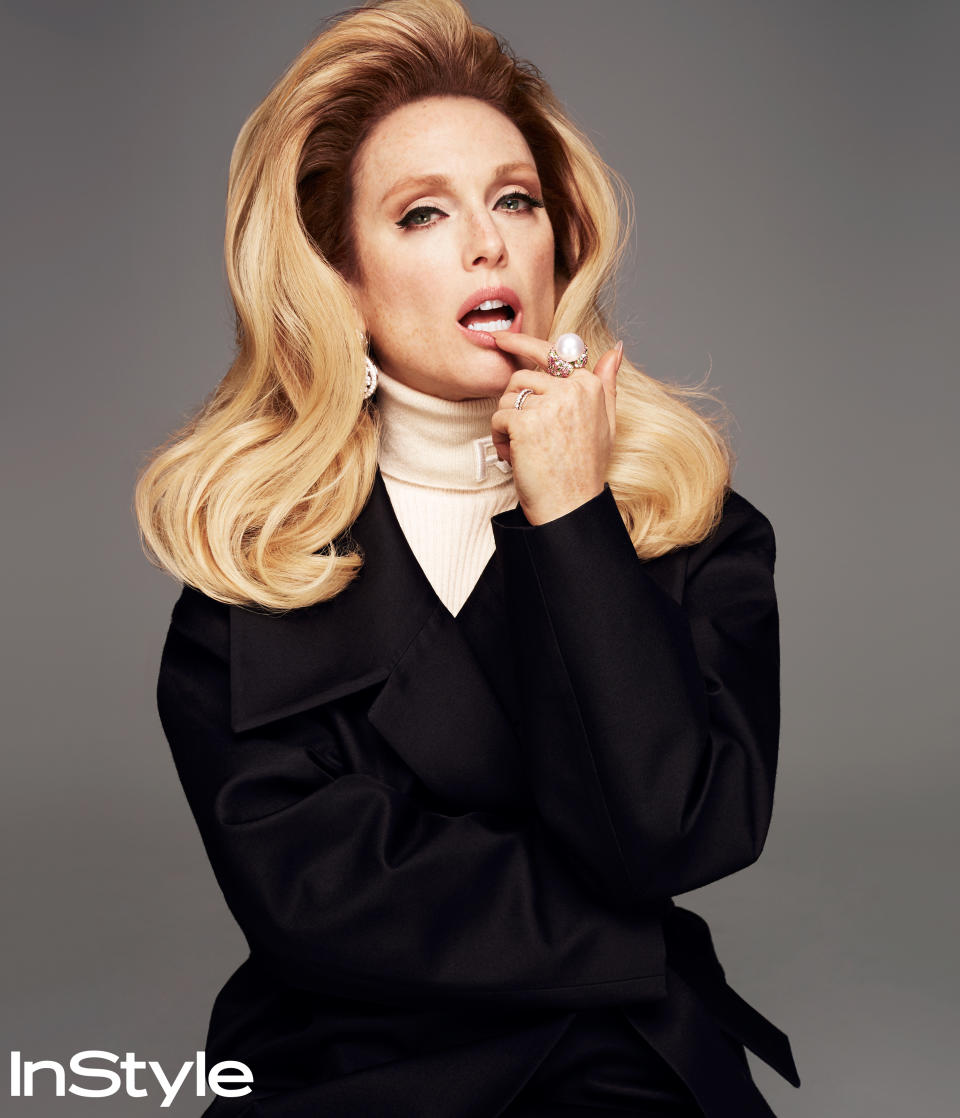Julianne Moore Gets Real About Getting Older: 'It's a Privilege to Age'
Julianne Moore is on vacation. And when she greets me outside her Montauk, N.Y., house, she’s the epitome of weekend chic in a white T and denim cutoffs. Two weeks after the shoot for this piece—we’d asked the Academy Award winner to portray six beauty archetypes—the only character Moore is playing is herself: blissfully unguarded.
Outside her front door is a towel covered with a family’s worth of sandy shoes, including her own black-on-black Birkenstocks. She’s midway through preparing tea and breakfast for her daughter, Liv, 15, who’s home sick from her summer camp counselor job. It’s early, so son Cal, 19, is still sleeping and husband Bart Freundlich is out with their two dogs, Cherry and Milly. The Moore-Freundlich cottage, originally a two-room fisherman’s shack built in the ’40s that’s been gently teased out to a small three-bedroom space, is totally quiet.
RELATED: Stars Share How Their Beauty Routines Have Changed Since Becoming Moms
She delivers Liv her breakfast and asks me what we should do first: interview or paddleboard? She paddleboards pretty regularly when she’s in Montauk; I’ve done it never. But she volunteered to take me out on the water behind her house. And when Julianne Moore offers you something, you say yes. You just do.
She grabs some aviators and a wide-brimmed straw hat, and we head through her backyard to the 181-acre Fort Pond, whose subtle murkiness is further testament to Moore’s game nature. She picks what she deems the most stable longboard for me and a sportier purple model for herself, handling the bulky boards with ease despite her petite frame.
As a teacher, to quote her character Maude Lebowski, Moore is a good woman, and thorough. On the water she talks about the neighborhood and her daughter’s job as I try to hold it together. “The wind is picking up,” she cautions about 40 minutes in. And within seconds it’s all over: I bobble, my arms flail, and I fall in. “Oh, no! Are you OK?” she asks, seeming genuinely concerned. I laugh. And so does she. We paddle the remaining 15 minutes back to her yard on our knees, in solidarity.
Back on dry land, we sit on her enclosed porch, and over blueberries, talk about her busy year. We’re in for a bit of a Juliannaissance this fall. Moore filmed three movies in 2016, one per season from spring through fall—and now by some alignment of stars all three are due out in less than two months. In those three films she played five characters. That’s a lot of personalities to manage, which speaks to her genuine interest in people—all kinds of people.
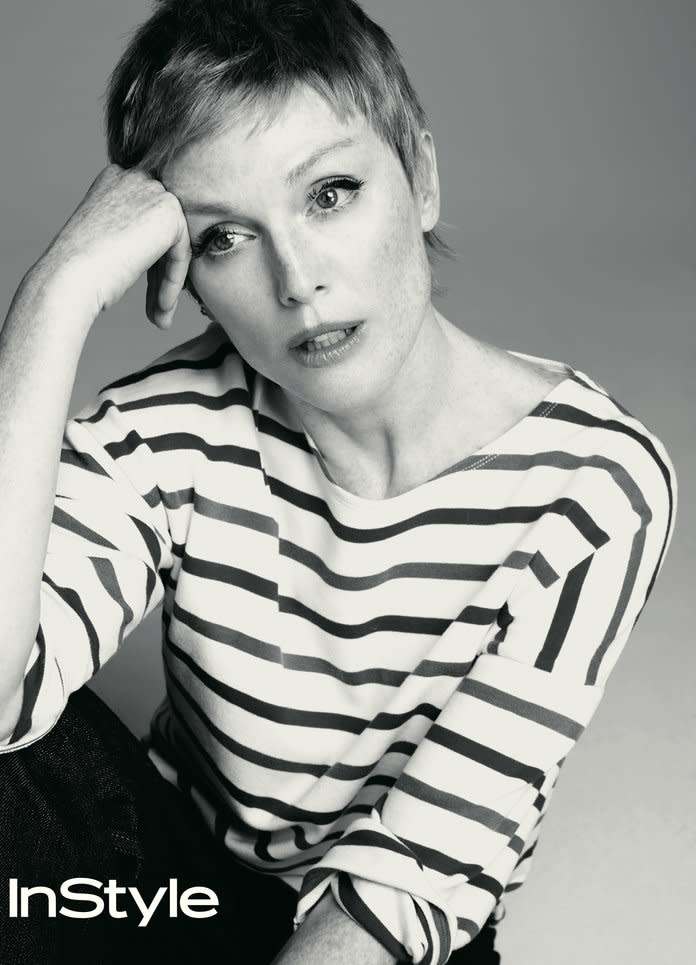
“I always think,‘What’s it like in there?’ ” she says, pointing to my heart and then my head. “ ‘What’s it like in there right now? What does it feel like?’ I’m so curious about it. I’ve always been that way. Understanding where we’re different and where we’re the same.”
Digging into each character excites her. Her eyes light up when she talks about shadowing a neurosurgeon earlier in her career. “I was always a good student, and I realize it’s still my favorite thing to do, learning something new, spending time with people who are experts and having them teach me,” she says.
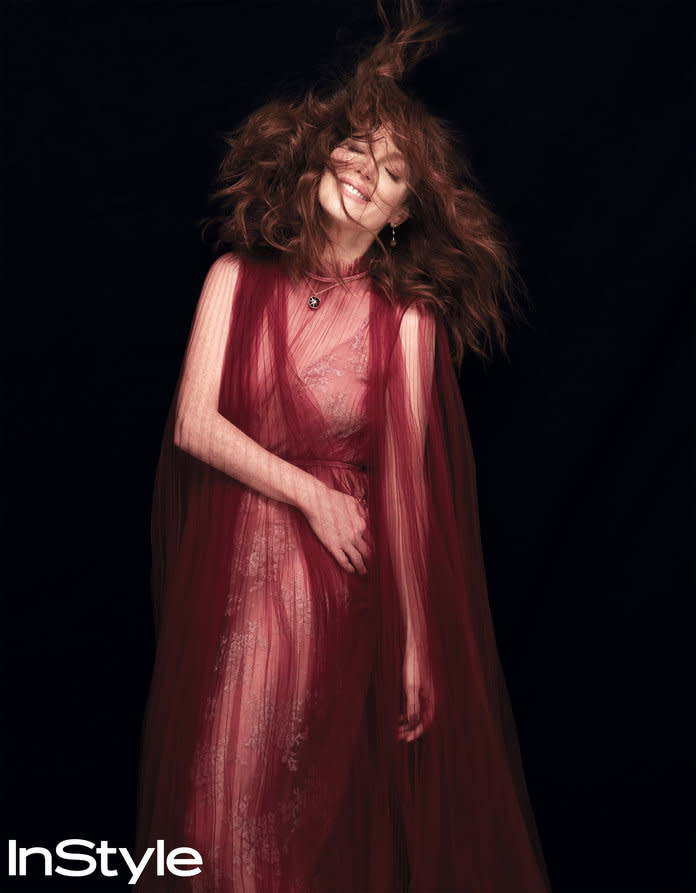
Education was majorly valued in her house growing up—Moore was born in Fort Bragg, N.C., and she moved around a lot as a kid because her father was in the military. Both her parents worked toward degrees after she and her two siblings were born. After serving as a helicopter pilot and paratrooper in the Vietnam War, her father went on to become a lawyer and a judge; her mother finished college when Moore was in eighth grade and then earned master’s degrees in psychology and social work. Moore’s own intellect shines through in her casual speech. (One of the marks of a voracious reader is someone who can drop “inculcate” into conversation without premeditation.)
And her appreciation for virtuosity extends in all directions. She can rattle off designers she’s obsessed with (Raf Simons, Clare Waight Keller, and Karl Lagerfeld) and, like many of us, seems to be a bit of a beauty junkie. A face of L’Oréal Paris since 2012, she admits to a love of Goop.com and advises that I check out the Botanica Bazaar, an apothecary-style boutique at Amagansett Square, where she recently picked up a lip and cheek balm that she loves. (She runs into her bedroom to grab it and show me the effects of the tint firsthand.)
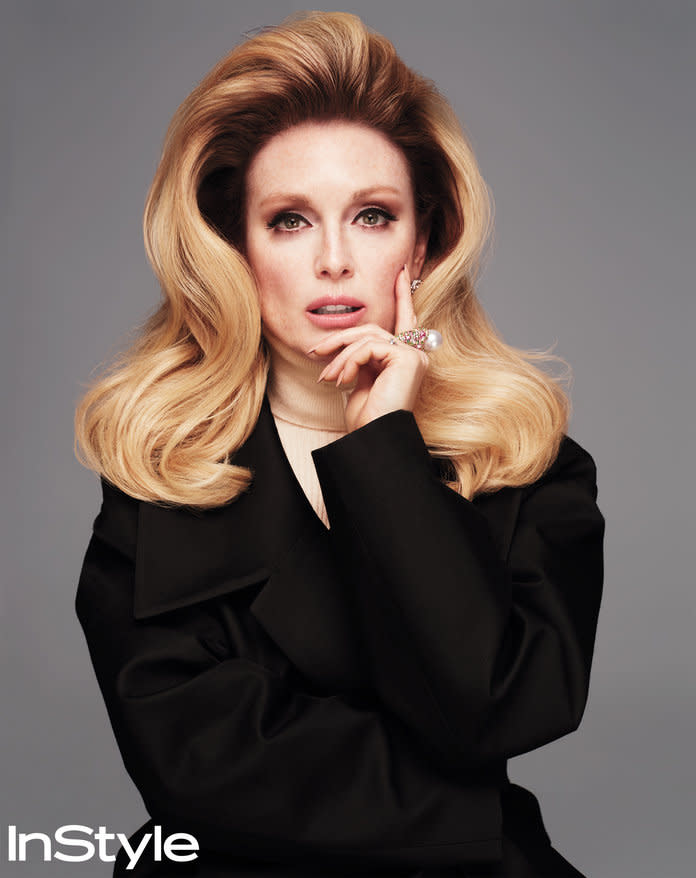
Moore brings the same curiosity to her roles. The first big release in her three-film run is Kingsman: The Golden Circle, the sequel to Matthew Vaughn’s 2014 British spy action flick, out September 22. In this installment Moore plays evil entrepreneur Poppy, who seems pleasant enough until she instructs a henchman to throw a colleague into a meat grinder. “I wanted Poppy to be someone who made you think that she’s strange but reasonable. She wants to be on TV, so a lot of what she does is really presentational. She wants to be seen.”
That idea, the importance of being seen, comes up again later in our conversation. I note that my colleagues and friends are keen on sharing anecdotes about Moore’s inherent niceness and overall decency. And I saw it myself at our shoot when, even after six complete overhauls in eight hours, she remained kind to everyone on set. It takes work to always give people a smile, to look everyone in the eye. It takes perspective.
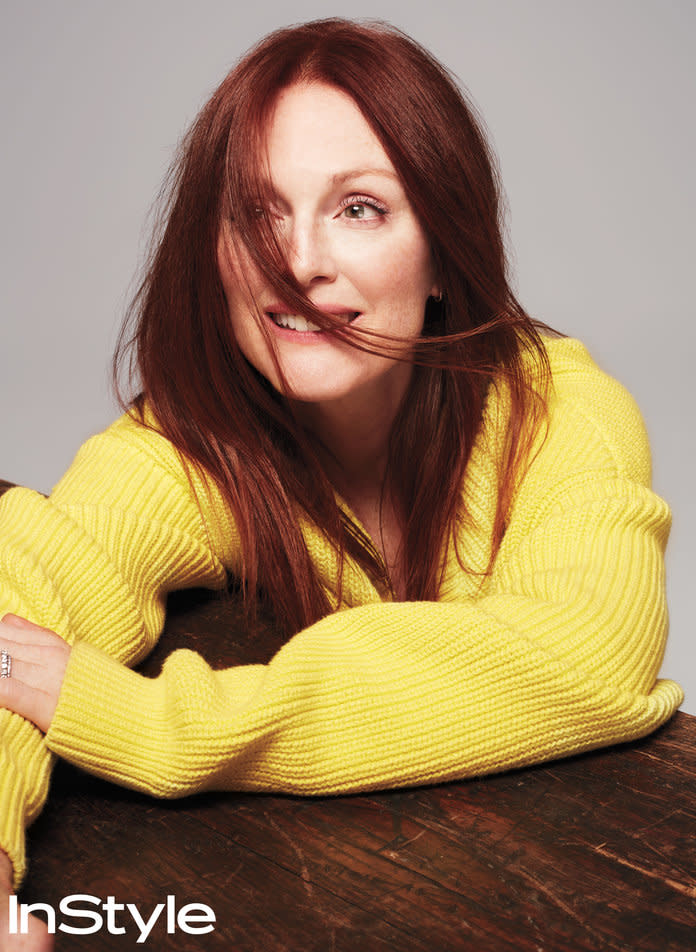
RELATED: Laura Dern’s Letter to Her 12-Year-Old Daughter Will Make You Cry: “Don’t Limit Yourself”
She flushes at the compliment. “I mean, I remember when I was a waitress when I was first in New York. I’d wait on tables and there were people who wouldn’t even make eye contact. It feels so terrible to have someone literally not look at you.” She pauses. “The worst thing you can do to someone is not see them, make them feel invisible. It’s really important for us as human beings that we acknowledge people, that we make them feel seen. Because why wouldn’t you?”
The second of Moore’s fall films reunites her with a longtime collaborator, director Todd Haynes. In Wonderstruck (out October 20), Moore plays two characters. The plot progresses on a dual time line, telling the story of a young deaf girl in 1920s New York and a young boy living in 1970s Minnesota. To prepare, Moore learned sign language, and for
her part in the ’20s narrative, she studied the silent films of Lillian Gish.
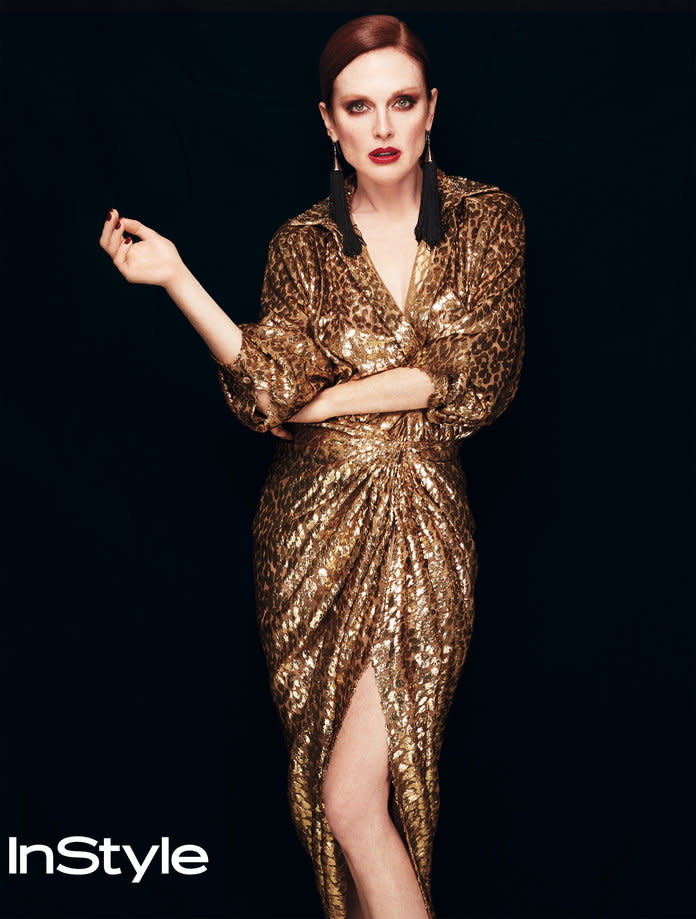
“The older I get, I find, the more I prepare,” she says. “I thought when I was younger that I was prepared. But—” she laughs here—“it just pales in comparison to the amount I do now. Maybe being young, you think, ‘Well, I know how to do this!’ and the older you get, the more you realize that you don’t know anything.”
Her approach to her work has changed in other ways too. When she was younger, she says, she saw her characters as totally separate entities from herself, believing she was supposed to turn herself off to be able to turn them on. Not anymore. “Now I realize I locate the characters within myself. I don’t have to suppress or get rid of anything that’s mine; I just figure out what to amplify. But you do have to access all your emotional function to get there.”
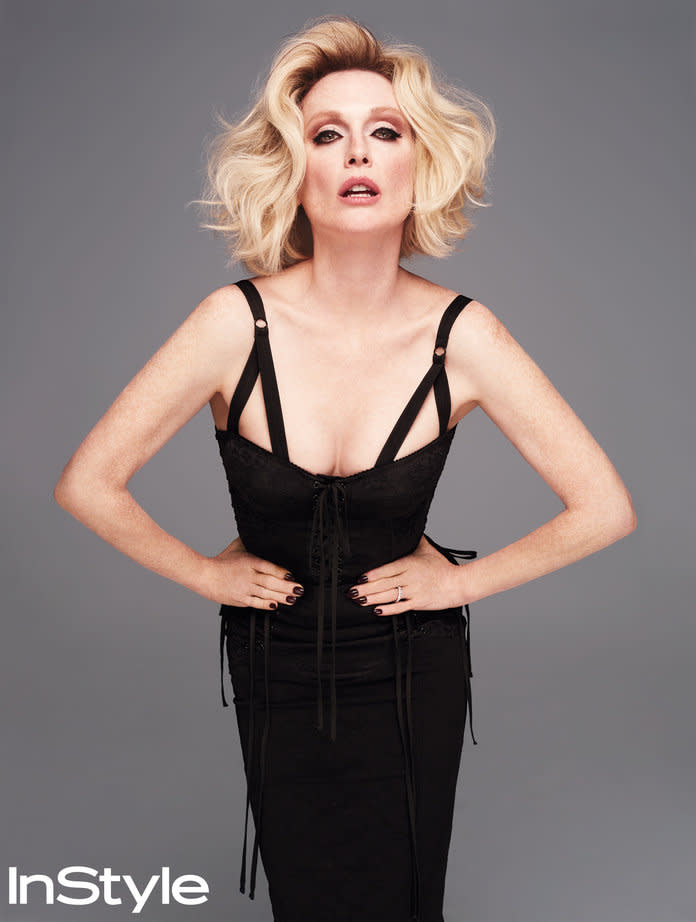
Because she found acclaim through the slow and steady, she says her 2015 Oscar win for Still Alice didn’t change her career dramatically. At 56, she’s built up momentum. And the idea of aging—or trying to reverse the process—just isn’t on her mind: “I mean, let’s not talk about this idea of ‘Oh, no! I’m going to be 40!’ You could be dead. So enjoy it. It’s a privilege to age! Even in scripts, they’ll refer to a character as ‘aging.’ Well ... everyone is aging. In literature and in movies, when people try to stop the process, it always ends in disaster. I think it’s really important to be where you are.”
Moore’s third film this season is the George Clooney–helmed Suburbicon (based on a script written by Clooney, Grant Heslov, and Joel and Ethan Coen), out October 27. In the ’50s-set comedy-thriller, Moore plays a pair of twins, which die-hard As the World Turns fans will know isn’t a total stretch—she won an Emmy in 1988 for playing half-sisters Frannie and Sabrina Hughes. Moore’s personal log line for the film is “regular people trying to get what they want in maybe not the savoriest of ways.”
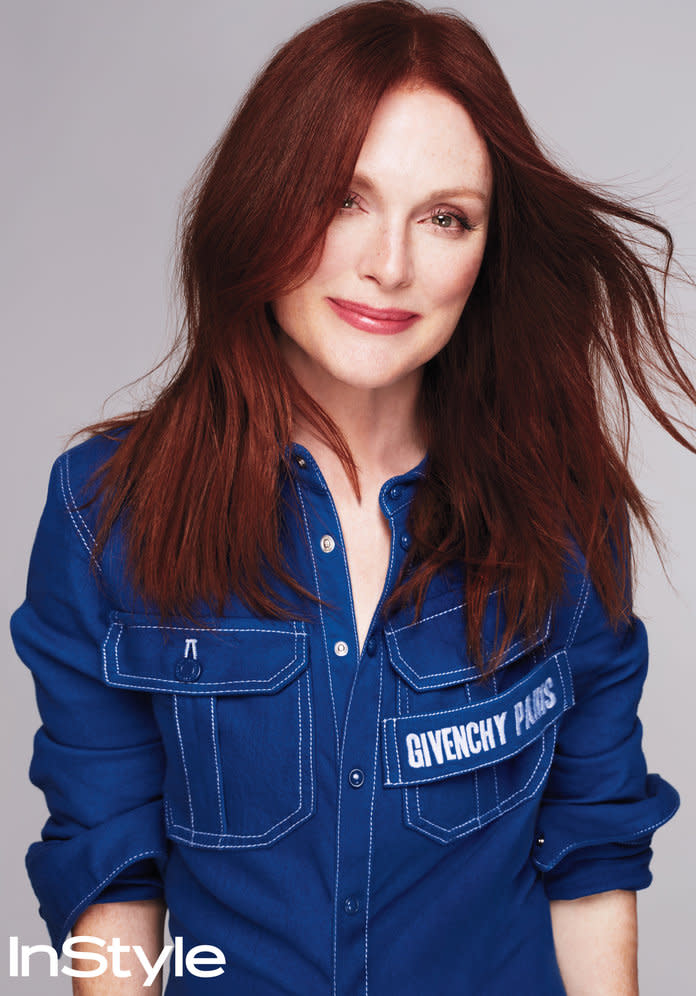
RELATED: Sheryl Crow on the Simple Change That Transformed Her Life
It’s the inverse of Moore’s real life: She seems to be getting what she wants ... and trying to stay a regular person. “I don’t think [my success] would be fun at all if I didn’t have a family to draw on and be in,” she says. “Bart and I have a very solid private life.”
This vacation is their last chance to be together before Cal goes to play basketball in Europe ahead of his sophomore year at Davidson College in North Carolina. That her N.Y.C. nest is half empty is “agony” for Moore. “We knew it was going to happen, but the reality of it is tough. From the time they’re little, your job is to give them the tools to take steps away from you, but when they do, it’s like, ‘Noooo!’ ”
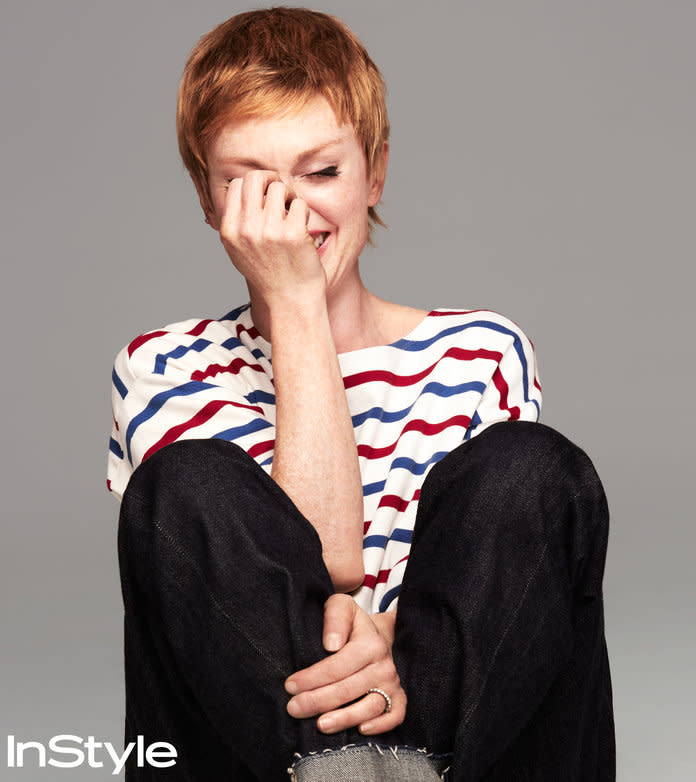
Her kids haven’t watched many of her nearly 90 performances, and she doesn’t encourage them to either. “I don’t need them to see me as anything but their mother,” she says. “It’s most important for them to know that I love my work, that I’m engaged in it.”
For Moore, the ensuing success has been almost incidental. “Sometimes I look back and think, ‘I don’t know how I even got this idea to be an actor.’ But I had a lot of interest in it, and that gave me the drive. I think the day I stop being so interested in it, I’ll be less ambitious.”
For more stories like this, pick up the October issue of InStyle, available on newsstands, on Amazon, and for digital download Sept. 15.
Fashion editor: Vanessa Chow for Streeters. Hair: Serge Normant for Serge Normant Hair Care with Statement Artists. Colorist: Gina Gilbert. Makeup: Gucci Westman for Home Agency. Manicure: Gina Eppolito for ginails.com. Set design: Bette Adams for MHS Artists.
